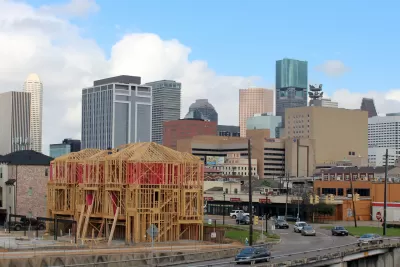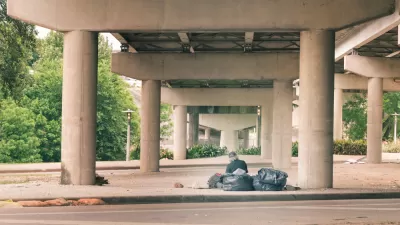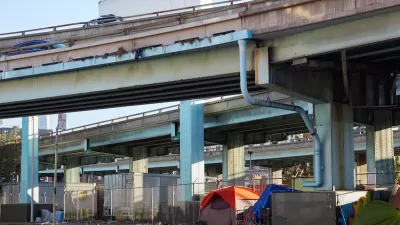While the numbers of unhoused people in other major U.S. cities grow, Houston has managed to effectively end veteran homelessness and house more than 26,000 people since implementing a ‘Housing First’ approach a decade ago.

What is driving Houston’s unparalleled success among big U.S. cities at reducing the number of people experiencing homelessness? As Danielle McLean explains for Smart Cities Dive, “The greater Houston area saw a 53% decrease in its homeless population between 2011 and 2020. During that time, the homeless population in the city and county of Los Angeles grew by 84%, New York City by 52%, and Dallas by 26%.”
McLean adds that “Since 2012, the Houston model has housed over 26,000 people, with 90% of them remaining housed for two or more years, according to Eichenbaum.” By 2015, the city ‘effectively ended’ homelessness among military veterans.
According to McLean, “Houston worked with surrounding county governments, various community stakeholders and nonprofit service providers to develop a model that, despite operating with a small budget, has decreased the area’s homeless population by roughly 63% since 2011, according to a recent city report.”
Houston’s success is attributed to three main factors:
- Housing First: “The city employs a housing-first model that prioritizes providing permanent housing to people experiencing homelessness as quickly as possible with no barriers to entry. The city then provides wraparound support services to ensure they remain housed.”
- A regional continuum of care that puts all organizations and agencies providing services to unhoused people under one umbrella.
- Data-driven decisionmaking that relies on proven data to allocate resources and decide on what projects and initiatives to support.
“But, according to Ann Oliva, CEO of the National Alliance to End Homelessness, success in other cities will depend on communitywide buy-in.” In Houston, widespread support from local officials and stakeholders have been an important aspect of the city’s success.
FULL STORY: How Houston’s homeless strategy became a model for other U.S. cities

Alabama: Trump Terminates Settlements for Black Communities Harmed By Raw Sewage
Trump deemed the landmark civil rights agreement “illegal DEI and environmental justice policy.”

Study: Maui’s Plan to Convert Vacation Rentals to Long-Term Housing Could Cause Nearly $1 Billion Economic Loss
The plan would reduce visitor accommodation by 25% resulting in 1,900 jobs lost.

Planetizen Federal Action Tracker
A weekly monitor of how Trump’s orders and actions are impacting planners and planning in America.

Grand Rapids Mayor Proposes Garage Conversion Plan
The mayor says allowing homeowners to convert garages to dwelling units could alleviate the city’s housing shortage.

Baltimore Ordered to Improve Sidewalk Accessibility
The city is one of many to face lawsuits for failing to comply with the Americans with Disabilities Act.

This Toronto Suburb Has More Bus Riders Than Columbus, Ohio
Brampton, Ontario used gradual improvements in service to prove that if you build it, they will ride.
Urban Design for Planners 1: Software Tools
This six-course series explores essential urban design concepts using open source software and equips planners with the tools they need to participate fully in the urban design process.
Planning for Universal Design
Learn the tools for implementing Universal Design in planning regulations.
Smith Gee Studio
Alamo Area Metropolitan Planning Organization
City of Santa Clarita
Institute for Housing and Urban Development Studies (IHS)
City of Grandview
Harvard GSD Executive Education
Toledo-Lucas County Plan Commissions
Salt Lake City
NYU Wagner Graduate School of Public Service





























